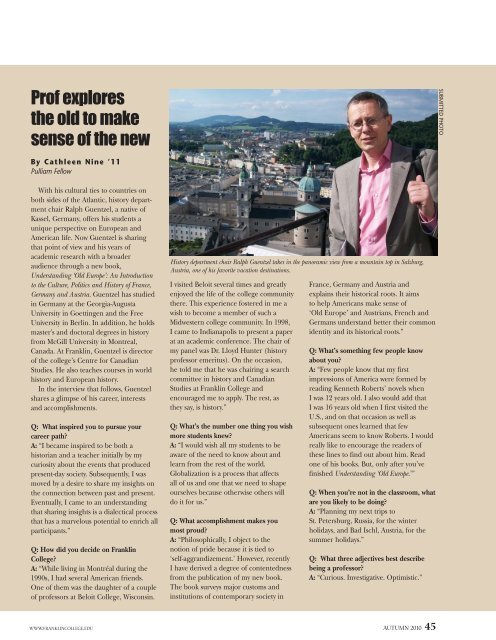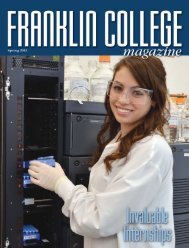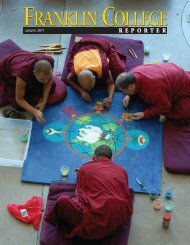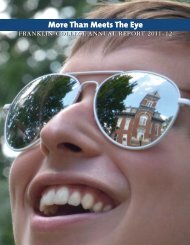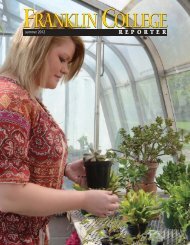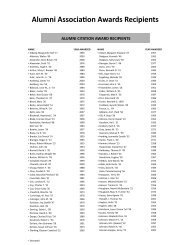Reporter autumn2010 -a - Franklin Alumni Network - Franklin College
Reporter autumn2010 -a - Franklin Alumni Network - Franklin College
Reporter autumn2010 -a - Franklin Alumni Network - Franklin College
You also want an ePaper? Increase the reach of your titles
YUMPU automatically turns print PDFs into web optimized ePapers that Google loves.
Prof explores<br />
the old to make<br />
sense of the new<br />
By Cathleen Nine ’11<br />
Pulliam Fellow<br />
With his cultural ties to countries on<br />
both sides of the Atlantic, history department<br />
chair Ralph Guentzel, a native of<br />
Kassel, Germany, offers his students a<br />
unique perspective on European and<br />
American life. Now Guentzel is sharing<br />
that point of view and his years of<br />
academic research with a broader<br />
audience through a new book,<br />
Understanding ‘Old Europe’: An Introduction<br />
to the Culture, Politics and History of France,<br />
Germany and Austria. Guentzel has studied<br />
in Germany at the Georgia-Augusta<br />
University in Goettingen and the Free<br />
University in Berlin. In addition, he holds<br />
master's and doctoral degrees in history<br />
from McGill University in Montreal,<br />
Canada. At <strong>Franklin</strong>, Guentzel is director<br />
of the college’s Centre for Canadian<br />
Studies. He also teaches courses in world<br />
history and European history.<br />
In the interview that follows, Guentzel<br />
shares a glimpse of his career, interests<br />
and accomplishments.<br />
Q: What inspired you to pursue your<br />
career path?<br />
A: “I became inspired to be both a<br />
historian and a teacher initially by my<br />
curiosity about the events that produced<br />
present-day society. Subsequently, I was<br />
moved by a desire to share my insights on<br />
the connection between past and present.<br />
Eventually, I came to an understanding<br />
that sharing insights is a dialectical process<br />
that has a marvelous potential to enrich all<br />
participants.”<br />
Q: How did you decide on <strong>Franklin</strong><br />
<strong>College</strong>?<br />
A: “While living in Montréal during the<br />
1990s, I had several American friends.<br />
One of them was the daughter of a couple<br />
of professors at Beloit <strong>College</strong>, Wisconsin.<br />
History department chair Ralph Guentzel takes in the panoramic view from a mountain top in Salzburg,<br />
Austria, one of his favorite vacation destinations.<br />
I visited Beloit several times and greatly<br />
enjoyed the life of the college community<br />
there. This experience fostered in me a<br />
wish to become a member of such a<br />
Midwestern college community. In 1998,<br />
I came to Indianapolis to present a paper<br />
at an academic conference. The chair of<br />
my panel was Dr. Lloyd Hunter (history<br />
professor emeritus). On the occasion,<br />
he told me that he was chairing a search<br />
committee in history and Canadian<br />
Studies at <strong>Franklin</strong> <strong>College</strong> and<br />
encouraged me to apply. The rest, as<br />
they say, is history.”<br />
Q: What’s the number one thing you wish<br />
more students knew?<br />
A: “I would wish all my students to be<br />
aware of the need to know about and<br />
learn from the rest of the world.<br />
Globalization is a process that affects<br />
all of us and one that we need to shape<br />
ourselves because otherwise others will<br />
do it for us.”<br />
Q: What accomplishment makes you<br />
most proud?<br />
A: “Philosophically, I object to the<br />
notion of pride because it is tied to<br />
‘self-aggrandizement.’ However, recently<br />
I have derived a degree of contentedness<br />
from the publication of my new book.<br />
The book surveys major customs and<br />
institutions of contemporary society in<br />
France, Germany and Austria and<br />
explains their historical roots. It aims<br />
to help Americans make sense of<br />
‘Old Europe’ and Austrians, French and<br />
Germans understand better their common<br />
identity and its historical roots.”<br />
Q: What’s something few people know<br />
about you?<br />
A: “Few people know that my first<br />
impressions of America were formed by<br />
reading Kenneth Roberts’ novels when<br />
I was 12 years old. I also would add that<br />
I was 16 years old when I first visited the<br />
U.S., and on that occasion as well as<br />
subsequent ones learned that few<br />
Americans seem to know Roberts. I would<br />
really like to encourage the readers of<br />
these lines to find out about him. Read<br />
one of his books. But, only after you’ve<br />
finished Understanding ‘Old Europe.’”<br />
Q: When you’re not in the classroom, what<br />
are you likely to be doing?<br />
A: “Planning my next trips to<br />
St. Petersburg, Russia, for the winter<br />
holidays, and Bad Ischl, Austria, for the<br />
summer holidays.”<br />
Q: What three adjectives best describe<br />
being a professor?<br />
A: “Curious. Investigative. Optimistic.”<br />
WWW.FRANKLINCOLLEGE.EDU AUTUMN 2010 45<br />
SUBMITTED PHOTO


